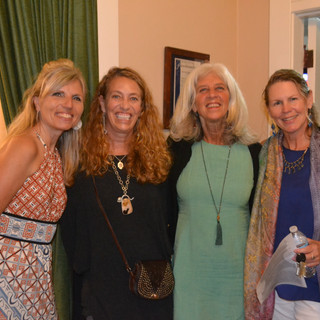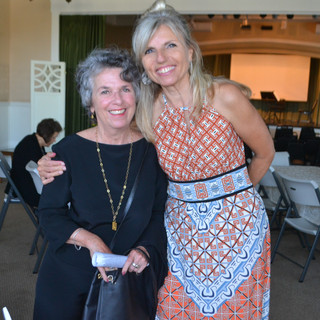Collective Joy from Music & Superb Quartet

And what happened at our Summer Concert 2018 was special. We saw a joyful, riveting, brilliant, accomplished young string quartet (assembled for the first time for this performance) consisting from the players of the San Diego Symphony. They are graduates of the best musical academic schools USA offers: Harvard (Andrew Hayhurst, cello), Julliard (Caterina Longhi, viola) , Columbia and Julliard (Yumi Cho, violin) and Cleaveland Music Institute (Jisung Yang, violin). Each of the musicians carried in their performance not only brilliant finesse & a parade of their talent, diligence, intelligence and deep soulful harmony with the music, but obvious love and passion for chamber music.
This Summer Concert, just like all of the previous five concerts in 2018, served not only as a celebration of music, but also a celebration of the independent Czechoslovakia marking this year a centennial anniversary. It was American President Wilson’ visionary document The Fourteen Points that helped achieve a creation of several independent states after the WWI. President Wilson’s direct support of our future president Masaryk’s effort to gain for Czechoslovakia an independence made it then happened.
Each concert of this year series presents some of the Czech or Slovak music that serves as a token of appreciation to American gargantuan help to achieve the most precious gift a nation can hope for.
The summer program featured two Romantic/New Romantic composers: Austrian Franz Schubert (1797-1828) with his String Quartet “Rosamunde”, No. 13 in A minor, op. 29. and a Czech composer Bedřich Smetana’s (1824-1864) Quartet No. 1 in E Minor From my Life.
Both of these pieces have something in common; they express the innermost detectable intimate feelings stemming from sensitive approach toward the life around them, both are courageous and suspenseful.
Schubert’s harmonically superb and melodious Rosamunde Quartet (named after a play for which some melodies where composed) is filled boldness, precision, whimsicality and at the same time seriousness taking the audience into the lands of fantasies that hover palpably in the air. Schubert expresses in this Quartet all what he is about: Melody that is memorable yet inventive and void of any banality; harmony that sends the chords into a brilliant eventful dance that may be dark or joyful, lyrical or narrative; tempo and dynamics that guide you through the landscape of dense music up and down, from left to right through the spectrum of emotions. Rosamunde Quartet is complex yet it does not tire you with its complexity. Instead makes you celebrate music, celebrate life, celebrate creativity, and listeners.

The second half presented Bedřich Smetana. Smetana's life became an exemplary life of a patriot devoting all he had to the fight for the national identity of the Czech nation.
Bohemia, under the Habsburg Empire since 1524, was desperately fighting for its independence and identity. The German hegemony, with Czech language never being and official language in Bohemia, with no Czech representation in any avenue of life, became unbearable. Czech nation, lead by the artists and academics, launched a movement, known in the Czech history as a National Awakening, with one goal: to establish Czech theaters, newspapers, associations, opera houses, publishing companies, etc. As the multination Habsburg empire centrally ruled experienced in 1848 a wave of national uprisings through its entire Empire, it allowed each nation to express itself somehow, within still strict limits. The Czechcs took it as a beginning of a long road that culminated into the Independence and a creation of its own state, Czechoslovakia, in 1918. Smetana and its generation stood at the beginning of this road. Yet, Smetana did not speak perfect Czech till he was 30! He was from a well-to-do family where German was require for carrying out business. Smetana’s national effort for his nation is exemplary and truly unprecedented. There was not a piece he wrote that would not deal with a Czech theme. From mythology, history, fairy tales, folklore to the Bohemian landscape, Smetana served as a humble yet mighty advocate for the Czech nation. Each position he held served as a platform for his noble successful fight. He is the most “Czech” composer the Czech nation produced.
Smetana’ s piece From my Life as an exemplary program music, unique in its narration of a clear program. Written in 1878, it is faithful its title, From my Life, summarizing his tragic second half of his life of a composer loosing completely his hearing suddenly, consequently loosing his job, his house in Prague, his beloved first wife and their two daughters, ultimately, loosing his mind, dying as a broken man in an asylum. Each movement of this moving four movement quartet is devoted to a certain part of this journey. The beautiful brooding viola solo at the beginning of the first movement opens a summary of his fight to come to terms with his deafness. The vivacious and so deeply Czech in its melody, harmony and a polka dance rhythm second movement, is reflection of Smetana’s happy youth, full of big ideals and goals, youth, happiness, exploration, and romantic love. The third movement is a tender, lyrical, soulful celebration of Smetana’s first wife, a love of his life. The Quartet is concluded by Vivace, a yearning for peace, yet interrupted by a high stubborn high E, a tone ringing in his ears, the only sound he had been hearing for the rest of his life.
The young dynamic Quartet swept me from my feet and from the feet of the sold out audience. The deep understanding of the innermost feelings of both composers was moving and astonishing. They approached each piece with tenderness and compassion, charisma and sheer finesse and brilliance. The sensuous interpretation of such an intimate deeply human and charming affectionate music loaned us wings of beauty, joy and love that will carry us home.
And for a moment, may it lasts, far is sorrow, evil and injustice, far is darkness and apprehension. Such is a power of collective joy from music, such is a power of composer’s humanity, and its sensitive intelligent and loving presentation by the soulful musicians.
























































































